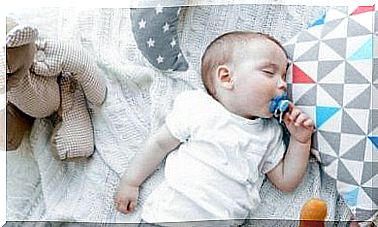What Should You Do If Your Baby Chokes On Milk?

One of the most terrifying things is not knowing what to do if your baby chokes on milk. In this article, we’ll look at why this happens and what to do if it happens.
Becoming a mother for the first time opens up a whole new world of worry. Every time your baby cries, you are alert. A low-grade fever can be a sign of a serious illness.
As mothers, our responsibilities are infinite. We do our very best, the best we can.
When it’s our first child, every feeling is even more intense. But when something dangerous happens, we have to keep a cool head and react quickly.
Panic doesn’t solve anything. Of course, it can be very difficult to stay calm when something happens to your baby. However, it is vital that you try to maintain your composure, both for your own good and that of your baby.
When it comes to doing something to prevent your baby from choking, fear only gets in the way. Be prepared for this situation, as a mother and protector: know what to do if your baby chokes.

What should you do if your baby chokes on milk?
Quickly place your baby on his tummy. Tap his back with the palm of your hand to make him cough.
It is common for small babies to choke while feeding. This often happens, for example, if they are breastfed in the wrong position.
However, if your baby is choking on solid foods, you should perform the Heimlich maneuver.
If this does not solve the problem, you should call the emergency number (112) as soon as possible . It is important to have all relevant telephone numbers at hand in a fixed place. After all, you never know.
Don’t feel guilty if your baby chokes during a feed. It’s something that can happen to anyone – adults too! How many times has a sip of water gone down your throat?
Why does my baby choke while feeding?
You can have various causes. Some of those causes are things we can change, while others have to do with their tiny, newly formed bodies.
If you notice that it happens very often, talk to your doctor or pediatrician about it. They will certainly be able to tell you what to do.
When it’s an outside problem
The flow of breast milk may be too strong. As soon as your baby is at your breast, milk flows directly into his throat.
You can solve this by putting pressure on the nipple or by taking a little milk just before you breastfeed.
If your baby is drinking from the bottle, the liquid may be flowing too fast. Newborn babies can’t handle this.
But this problem can be solved, if you give it time and patience.

When it’s an internal problem
Some babies have internal conditions that affect their ability to swallow or cause gastroesophageal reflux. This means that the contents of the stomach return to the mouth.
To check whether the problem is internal and not related to external factors, it is best to contact a medical specialist.
To reduce the risk of choking, you can place your baby on his stomach. Or, better yet, don’t put your baby to sleep immediately after a feed, but keep him in an upright position for a while.
If reflux occurs, your baby can cough or spit in this position without any risk of choking.
Never let your baby drink from a bottle unsupervised. Wait until he is a little older to make sure there is no risk of choking.
Try to keep his crib in your room, at least for the first 6 or 7 months. That way you can keep an eye on your baby all the time.
Choking is not rare during early childhood. Talk to other moms and you’ll find out: this situation is much more common than you think!
Babies are very fragile creatures and they need your help to learn how to do things.
Don’t be afraid of this. Your child can eat and drink without your help in no time. You will then be much less afraid that something will happen to him.
But until then, stay alert. Keep these tips on what to do if your baby chokes in mind , to avoid unnecessary anxiety.









